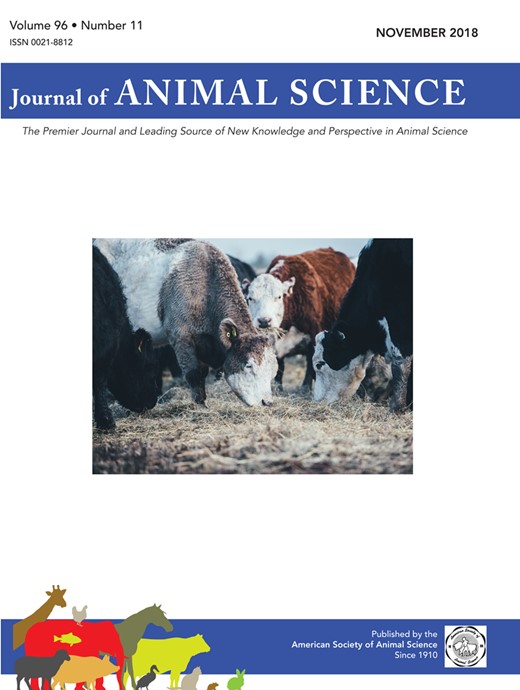-
Views
-
Cite
Cite
Bonjin Koo, Daymara Bustamante-García, Charles Martin Nyachoti, Energy content and nutrient digestibility of diets containing Lactobacillus-fermented barley or wheat fed to weaned pigs, Journal of Animal Science, Volume 96, Issue 11, November 2018, Pages 4802–4811, https://doi.org/10.1093/jas/sky344
Close - Share Icon Share
Abstract
This study was conducted to determine the energy content and apparent total tract digestibility (ATTD) of nutrients of diets containing Lactobacillus-fermented barley or wheat fed to weaned pigs. Thirty-six weaned pigs (8.14 ± 0.65 kg of body weight) were randomly assigned to 1 of 6 diets in a completely randomized design to give 6 replicates per diet. Pigs were individually housed in metabolism crates to determine digestible energy and metabolizable energy contents. Net energy was also calculated from the average of 2 equations published by Noblet et al. (1994). Diets were fed at 2.5 times the maintenance energy requirement for 10 d of adaptation and 5 d of total but separate urine and fecal collection. Samples of barley or wheat were fermented for 90 d under anaerobic conditions with an inoculum of either homofermentative Lactobacillus plantarum (Homo) or heterofermentative L. buchneri (Hetero). Three diets were formulated based on either barley or wheat to consist of a control diet containing 42% unfermented grain and 2 diets containing either Homo-fermented or Hetero-fermented grain. Preplanned contrasts were used to evaluate the effects of the inclusion of fermented barley or wheat and to compare the effects of Homo-fermented with Hetero-fermented grains. Fermented wheat inclusion in a diet increased ATTD of gross energy and phosphorus, and retention of gross energy by 1.9%, 6.8%, and 6.3%, respectively. Also, fermented wheat diets had greater (P < 0.05) metabolizable energy content and tended to have greater (P ≤ 0.10) net energy content than unfermented wheat diets. However, inclusion of fermented barley did not increase nutrient and energy digestibility. Hetero-fermented diets contained greater (P < 0.05) digestible energy and net energy content (DM basis) than Homo-fermented diets. Pigs fed barley-based diets showed less (P < 0.05) ATTD of DM, nitrogen, and gross energy than those fed wheat-based diets. In conclusion, wheat fermented with Lactobacillus-inoculum can be beneficially substituted for unfermented wheat, improving the ATTD of nutrient and energy, nitrogen retention, and energy content. Also, Hetero-inoculum is preferable to Homo-inoculum for grain fermentation considering greater energy content in weaned pigs.





